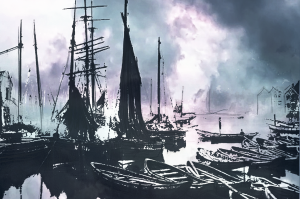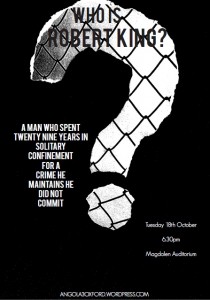
Apocalypse Soon: A Review of Pacifiction (2022)
by Alexander Archer | May 27, 2023

The title of Albert Serra’s* most recent film Pacifiction is meant to be a portmanteau of ‘Pacific’ and ‘fiction’, but it might just as well be viewed sideways as an addled variation on the word ‘pacification’. The film, a nearly three-hour submersion into the lush, narcotic, paranoid world of modern-day Tahiti, is fundamentally concerned with the fictions and pacifications that constitute the French colonial apparatus there: it follows De Roller (Benoît Magimel) – the French high commissioner – as he drifts through the biopolitical swamp of his own authority, mediating between the locals and his government with fleshy savoir faire and charm that borders on nauseating.
(*look him up: Catalan auteur par excellence, cinema-libertine, proponent of red carpet drip that could only be described as ‘extreme’.)

De Roller’s main job is to keep everything under control, and he does so by telling stories. Dressed invariably in an ice cream coloured, double-breasted linen suit and blue sunglasses, he conducts his business in nightclubs and hotels, alternately making promises and threats, weaponising an intoxicating, paternalist narrative of ‘French Polynesia’ that seems to subdue all opposition. He is driven around in a ghostly Mercedes, so spotlessly white that it looks boiled. Unfortunately for De Roller, his authority rests on not much more than placebo, so when sinister rumours begin to spread across the island – of the sighting of a mysterious submarine, of local girls returning from it in bad physical states, of civil unrest brewing, even of the French military planning to resume nuclear testing on the islands for the first time in 20 years – his airy reassurances begin to betray a slight anxiety, even dread, as power begins to slip from his grasp. The weather becomes wilder. Strange interlopers arrive with diplomatic passports. The local nightclub begins to teem with marines and seedy old men, whose presence makes De Roller’s come off as almost cuddly in comparison… Unknown powers descend on the high commissioner’s little kingdom like insects swarming around a spilled daiquiri.

The film’s cinematographer, Artur Tort, does an absolutely mesmerising job of suffusing each of the film’s images with apocalyptic unease – all the shots are vast and monstrously precise, so much so that they marginalise and suffocate any action taking place within them. Serra’s Tahiti is a clammy extrapolation of Paul Gauguin’s, taking his luminous hues and forcing them onto his 21st century visual landscape, and in doing so making it inert. The film’s bright, hallucinatory colours bind its world into a sort of stasis, as though the film’s aesthetic armature were a series of rather menacing airport postcards. This principle extends to the human body too: sweat in Pacifiction doesn’t drip – it clings. In general terms, though, Serra’s merciless leaning into kitsch (immanent critique, anyone?) makes for a gorgeous visual experience, setting the viewer adrift on a hyperglycaemic ocean of barely concealed violence.


As for the performances, the cast – all wonderful – spend most of the film very convincingly teetering on the edge of either inebriation or sleep, making helpless faces as De Roller inexorably monologues at them about geopolitics, nuclear armageddon, and occasionally even dramaturgy. Distinctive figures include: a sapphic-predatory Charlotte Gainsbourg clone who runs the local dance troupe/cockfighting ring; a woolly-eyed, dance-loving admiral whose troubling relationship with atomic weapons wouldn’t be out of place in a Dr Strangelove remake (which, based on French retitling conventions, would probably be called something like Dr Strange-sex); and De Roller’s stalker, a quiet American played by an actor with the improbable name of ‘Mike Landscape’.

(Mike Landscape is, at least, allowed to eat on the job.)
The real star of the show, though, is De Roller himself. Magimel’s performance is utterly magnetic, at once relaxed and lymphatically intense. He pads through his scenes (which are all the scenes) with the troubled look on his face of someone who is one sneeze away from transforming into Gérard Depardieu. For a high commissioner, he spends remarkably little time actually doing his job – he’s more interested in riding a jet-ski around, ‘writing’, and striking cool poses in abandoned football pitches. And when we do see him at work, he is barely competent; his attempts at public speaking play out like a messy Boris Johnson impression. By the final stretch of the film, in fact, De Roller becomes an almost pathetic (in both senses) figure, wandering desperately through the island by twilight, trying to make any sense of what is going on. Politics, he says, is like a nightclub, but he’s stuck inside, doesn’t like the music very much, and has had a few drinks too many (though not enough to enter what Under the Volcano enthusiasts might call ‘the fun zone’). He can’t stop the imminent nuclear tests – he can’t even find the submarine that is supposed to be orchestrating them – because the military represent a stratum of instrumentalised, geopolitical brutality he can barely comprehend. De Roller is out of his depth.

So, although it might come off as a thriller at first glance, Pacifiction is really a pre-apocalyptic tragicomedy about the final days of a failed French colonial project, just before it permanently sinks into tropical oblivion. It is easy to miss out on just how funny the film is, sliding into murky, political farce as De Roller’s projection of himself becomes ever more estranged from his actual function. Surprisingly enough, the best cinematic comparison to be made would be with Twin Peaks: one particularly captivating scene near the end of the film, in which the admiral takes to the luridly purple nightclub dancefloor and does the septuagenarian equivalent of bussing it down (to Freddy Butler’s I Like Your Style), is a direct echo of the heart-breaking “It is Happening Again” scene in Twin Peaks. De Roller can but sit by and watch grimly as the music changes, and the club is transformed into a Black Lodge of a symbolic political space, with the marines slow dancing into centre stage to wordlessly let everyone know that, yes, ‘it’ (the nuclear violation of the islands, the vicious destruction of the locals’ lives and traditions, the inscription of a logic of violence directly into Tahiti’s Edenic landscape) really is happening again, and there’s nothing anyone can do to stop it.

Words: Alexander Archer
All images taken from Pacifiction (2022)




